For the past few years, my fellow travel writers have been waxing poetic about Tbilisi, the capital of the of country of Georgia. This tiny nation, hampered with a name that is often confused with the State of Georgia in the U.S., was suddenly being added to everyone’s wish list. For decades, Georgia was virtually unknown in travel circles. Most didn’t even realize that the Caucasus, as the region is known, is part of Europe. Tucked between the Greater Caucasus Mountains in the north, the Lesser Caucasus Mountains to the south, the Black Sea to the west, and the Caspian Sea to the east, the three Caucasus countries of Georgia, Armenia, and Azerbaijan form the border between Europe and Asia.
Those who had visited Georgia raved about the variety of things to do in Tbilisi. The city’s gorgeous churches, historic wooden houses with ornamental carved facades and balconies, quirky Old Town, glittering glass and steel Peace Bridge, sidewalk cafes, and the region’s famous wines were all touted as top attractions. And if that wasn’t enough, I was repeatedly reminded that Americans get a year visa upon arrival, no questions asked. I was sold. I booked my ticket and set off to explore the region.
On my first day I needed to wind down from my overnight train from Baku, Azerbaijan. I dumped my luggage and went for a leisurely walk in the Marjanishvili neighborhood, with its beautiful 19th century mansions. I struck gold that first day when I wandered into Barbarestan Restaurant, reputed to be the top eatery in Tbilisi. I was treated to a delicious meal based on ancient Georgian cuisine and waddled back across the street to my hotel, filled with excitement about my next few days.
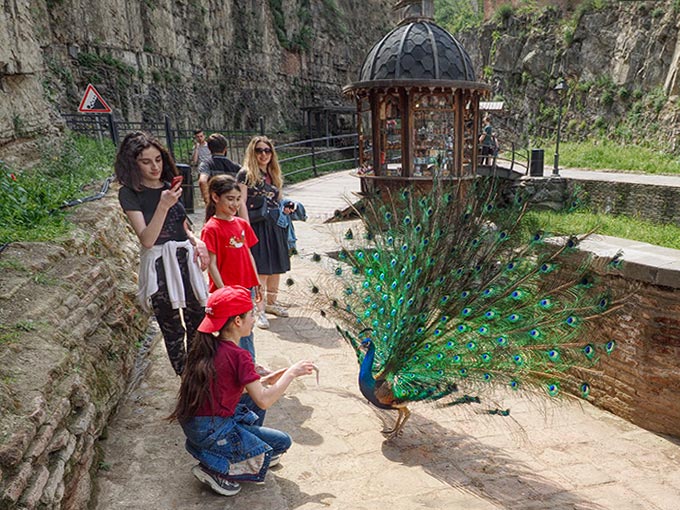
After a good night’s rest I set out to see the old wooden houses, the ancient Persian Sulphur Baths, and Dzveli Sulphur Waterfall in Old Town. The path leading to the waterfall was crammed with tourists and touts looking for tips. Men with peacocks, monkeys, and falcons on leashes roamed through the crowd. One of them placed a falcon on my arm. When I looked directly at him and said, “I have no money,” the bird was promptly removed.
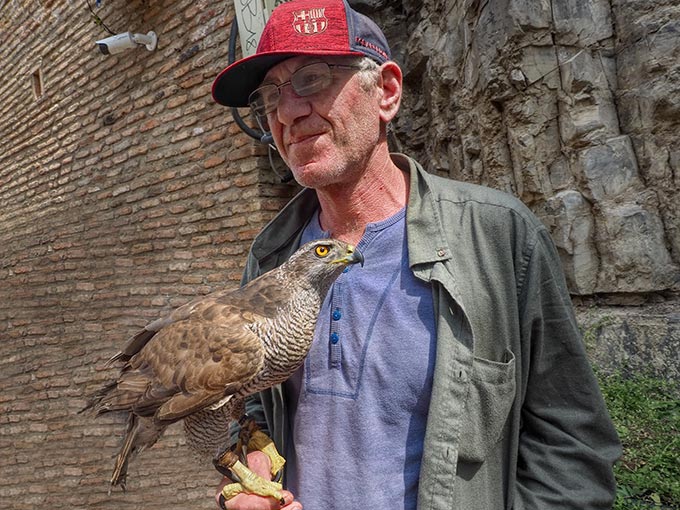
As for the historic wooden houses and Persian Sulphur Baths, I was sorely disappointed. The wooden houses were few and far between, and the old brick and concrete Persian baths were more in demand as a playground for kids than for their traditional scrubs.

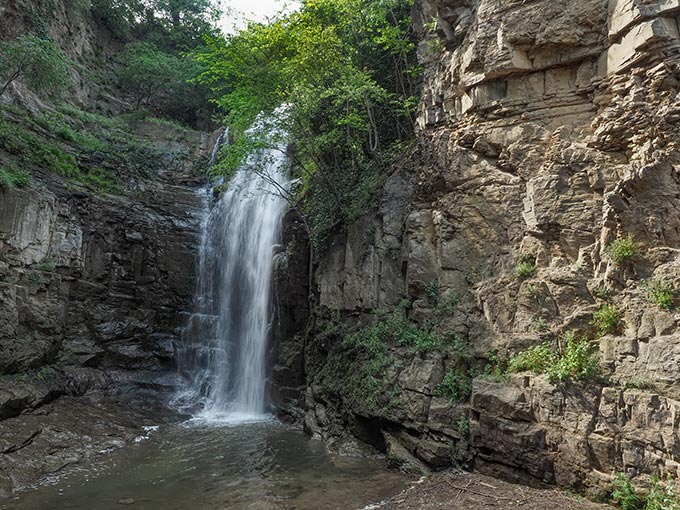
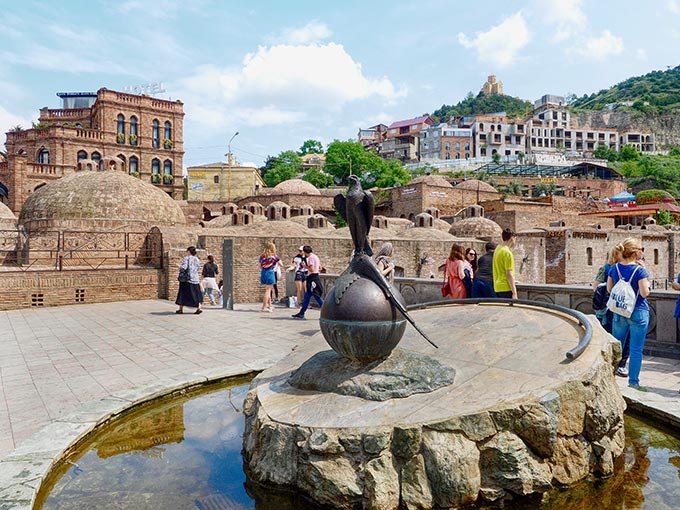
Hoping to escape the masses, I wove through a pedestrianized street where restaurant tables left only a foot or two for people to pass. Eventually I reached the foot of the Peace Bridge, a modern structure of glass and steel tubing that spans the heavily polluted Mtkvari (Kura) River. The bridge was pretty, but the experience of walking across was ruined by young men who loitered along its length, blasting tunes from boom boxes. It reminded me a lot of the energy on the St. Charles Bridge in Prague, another case of too much tourism success.
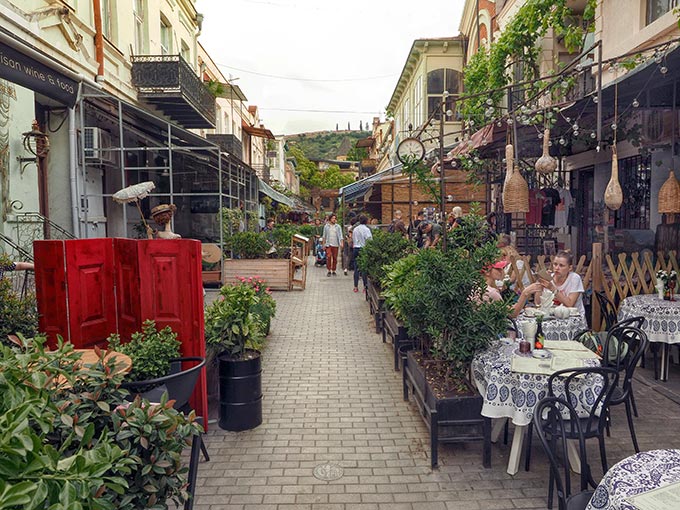
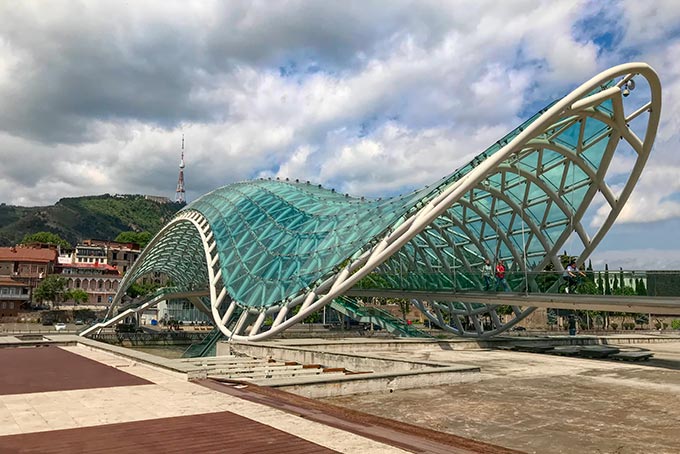
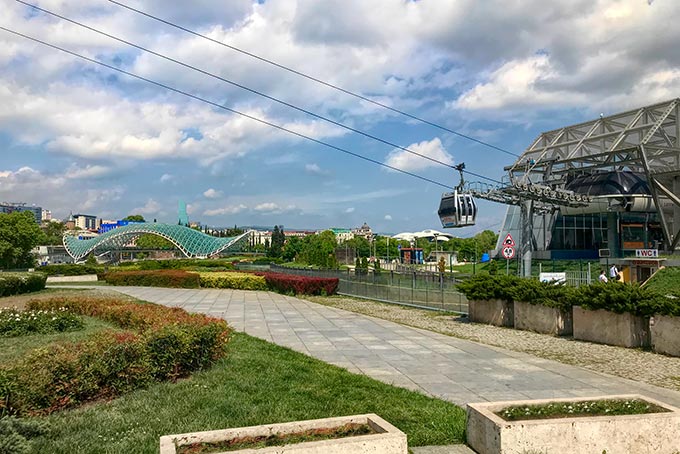
By this point, I was becoming disenchanted but I decided to give the city another chance. I began day three at SOSA Artisanal Cafe and Bakery (a real find!), where I spent a pleasant hour over coffee and chocolate eclairs, chatting with the delightful Turkish owners. Then it was time to hit the pavement again.
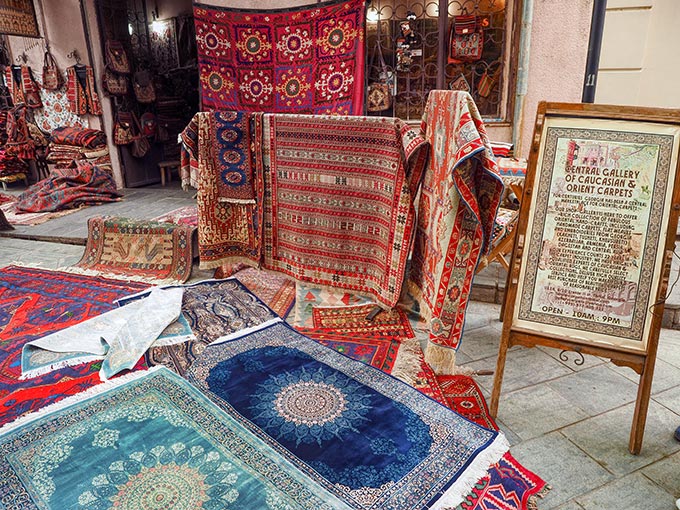
My initial destination was the Dry Bridge Flea Market. This wonderland of Soviet-era war medals, silverware, jewelry, and traditional Caucasus rugs was terrific eye candy, but I wasn’t in the market for chachkes. I continued onto Rustaveli Avenue, home to museums, the Parliament of Georgia, the Tbilisi Youth Palace, and the weekly Tbilisi Street Market. At the terminus of Rustaveli Avenue I found Freedom Square and Pushkin Park. The neighborhood was interesting but certainly not spectacular.
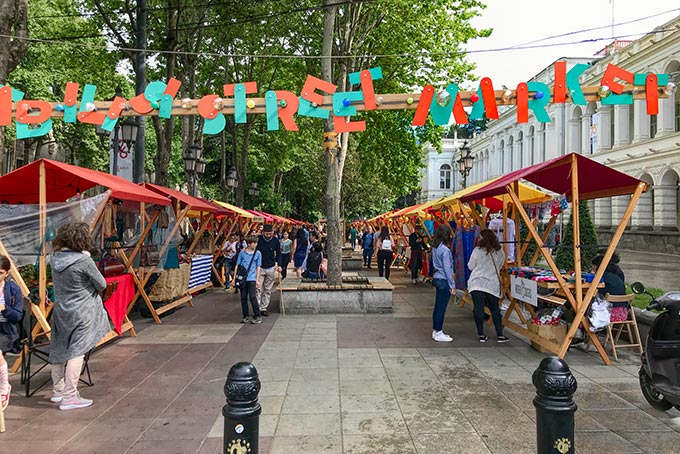
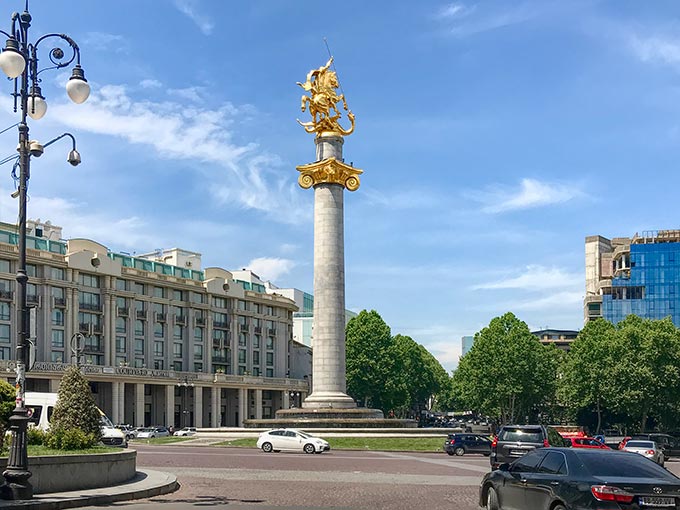
With a good five miles to my credit, I decided to call it a day. I found a sidewalk cafe with vegetarian options and ordered a Greek salad. A few minutes later my server placed a tiny veggie sandwich in front of me. Rather than cause a fuss, I decided to just eat what they’d served me.
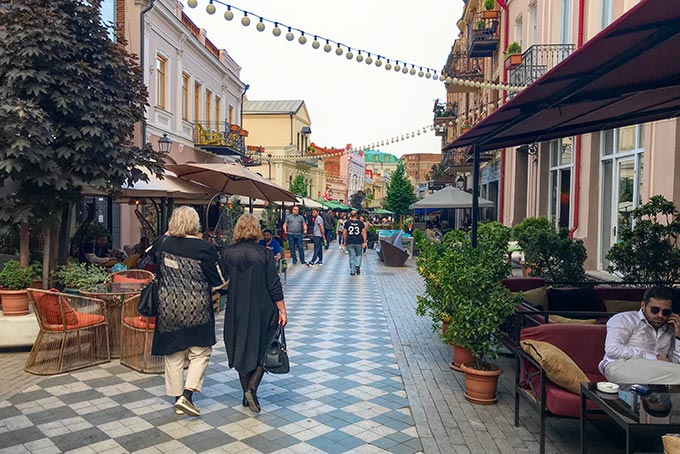
Throughout my meal, the staff was inattentive, more concerned with smoking and cracking jokes with friends. They did, however, find time to throw a glass of water at a lovely black Labrador, one of Tbilisi’s ubiquitous stray dogs that have been spayed and given shots. That was it for me. I was incensed. Moments earlier, the dog had been sitting at my feet, happily letting me scratch its head. “Why are you doing that?” I asked. “It’s a sweet dog.” My server said the people at the table behind me were afraid of it. Disgusting. No tip for that crew.

By day four I was totally disappointed. I simply couldn’t reconcile the city that had been described to me with the city I was experiencing. Certain that I must have missed some of the most interesting things to do in Tbilisi, I returned to the Old Town area to take another look. At the Leaning Clock Tower of Tbilisi a mob of tourists was waiting for an angel to emerge and strike a bell at the top of the hour. But even this was not the history I was looking for. The clock tower had been built in 2010 by puppet master Rezo Gabriadze to advertise his adjacent puppet theater.
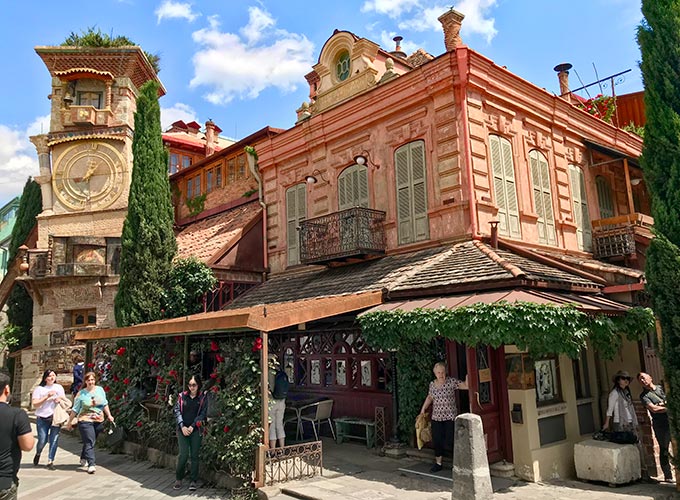
Frustrated, I turned onto ancient stone-paved streets that wound up the hillside behind the Old Town tourist area. The area was not shown on any tourist map, but here, at long last, I found a handful of authentic houses and shops, as well as two gorgeous old churches. At the top of the hill I rested in the peaceful courtyard of Jvaris Mama Church, with its burbling Artesian spring. Back down at the foot of the hill I stopped into Sioni Cathedral. In addition to its stunning mid-19th century Iconostasis, the cathedral is home to the sacred cross of St. Nino, the patron saint of Georgia. The cross is said to be made of grapevine branches woven with the saint’s own hair.

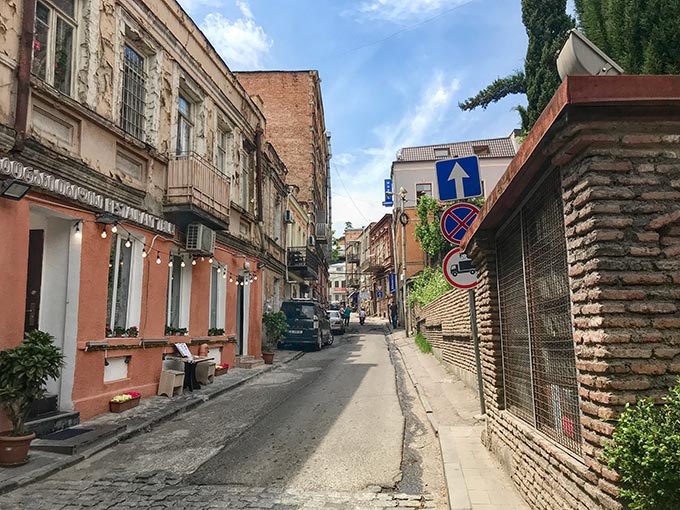
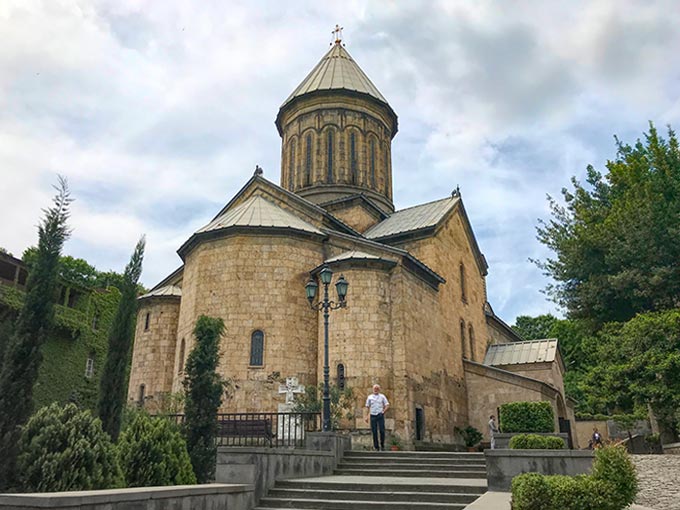
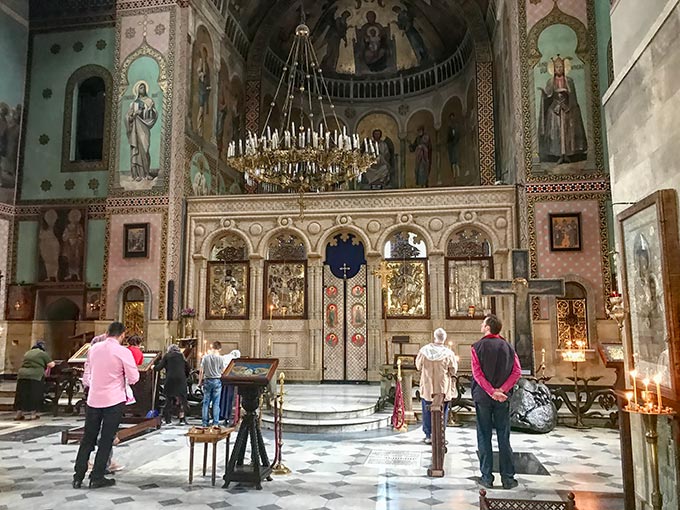
Hoping to cap off the day with the pièce de résistance, I crossed back over the Mtkvari (Kura) River and trudged uphill to Holy Trinity Cathedral. Known to locals as Sameba Cathedral, Tbilisi’s newest church was completed in 2004. The immense Cathedral was built to commemorate 1,500 years of the Georgian Orthodox Church and the 2,000th anniversary of the birth of Jesus. It is the third-tallest Eastern Orthodox cathedral in the world and one of the largest in the world by total area. It must have cost millions to construct. Considering that the average monthly salary for most Georgians is about $400, and that the city still dumps untreated municipal wastewater directly into the river, the money spent on this church seems particularly unconscionable.

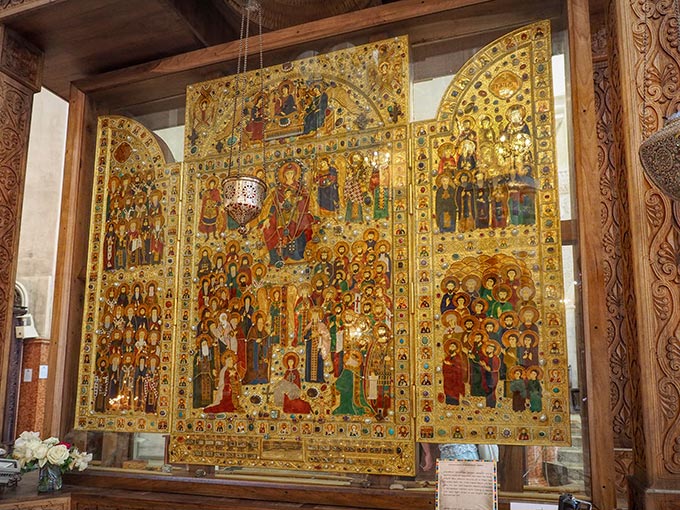
Even worse, the structure is cold and sterile, both inside and outside. The only interesting thing inside the church was a jewel-encrusted “Hope of Georgia” Icon but even that turned out to be modern. The church offered people the opportunity to donate their gold and silver jewelry, which was recycled as religious ornamentation for the Icon. Disgusted, I finally gave up and returned to my hotel, where I booked a tour of the surrounding countryside for my final day. Hopefully, the rural areas will offer more of an authentic travel experience because, for me, Tbilisi was little more than a Georgian Disneyland.
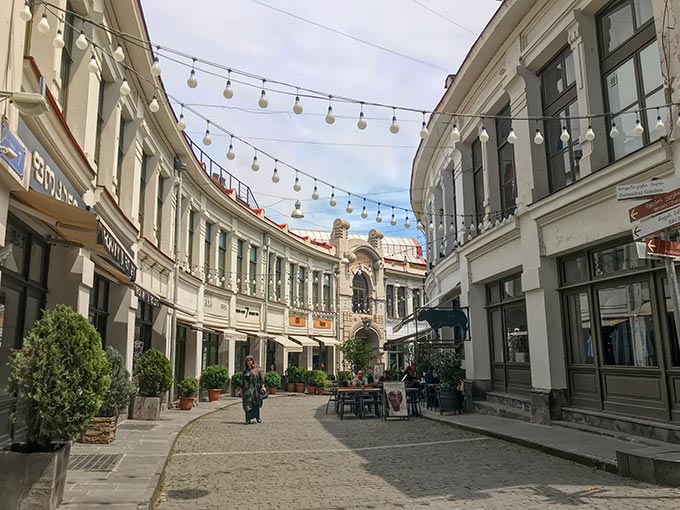
You may also enjoy:
Interior of St. Basil’s Cathedral in Moscow, Russia
The Mail Order Bride Scam in Ukraine
Albania – The Holy Grail for Intrepid Travelers
